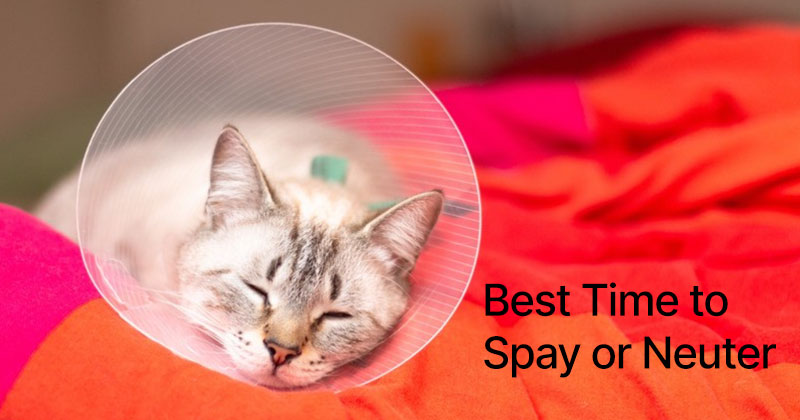
Spaying or neutering your cat is a significant decision that not only benefits your feline but also helps manage the broader pet population. Whether you’ve recently welcomed a kitten into your home or you’ve had your pet for a while, knowing the best time to spay or neuter a cat is crucial for their long-term health. At Skyline Veterinary Clinic, we understand that timing can feel overwhelming, and this blog is designed to help you make the most informed decision possible. Let’s explore when you should consider this procedure and what you need to know.
Spaying or neutering a cat helps prevent overpopulation and improves their quality of life. It reduces the risk of certain cancers and infections in females, while neutering males lowers the chances of testicular cancer, roaming, and marking behaviors. Neutered males are also less aggressive and less likely to contract diseases like FIV or FeLV. Overall, spaying and neutering lead to a healthier, calmer cat and a more peaceful home.
Veterinarians typically recommend spaying or neutering cats between five to six months old, as this prevents unwanted behaviors like spraying while allowing the kitten to mature for surgery. Early spaying, as early as eight weeks, can also be beneficial, especially for shelter kittens. The ideal timing depends on your cat’s breed, health, and circumstances. Consult with your veterinarian to determine the best time. For guidance, call Skyline Veterinary Clinic at (402) 933-6800 to schedule an appointment.
Spaying or neutering your cat at around five to six months of age has several advantages. At this stage, your cat has grown enough to handle surgery but has not yet entered sexual maturity. For male cats, neutering before puberty often prevents behaviors like spraying and territorial aggression. Spaying females before their first heat cycle significantly reduces their risk of developing mammary tumors later in life. These long-term health benefits can make this window ideal for many cat owners.
Waiting too long to spay or neuter a cat can lead to more complications, both behaviorally and physically. Cats that are allowed to reach sexual maturity may begin to display undesirable behaviors such as marking territory or becoming aggressive. Unspayed females may go through multiple heat cycles, which can lead to frustration and vocalization. There is also an increased risk of cancers and infections. Delaying the procedure too long can impact your cat’s well-being, so timing is key.
Though the ideal time to spay or neuter a cat is during kittenhood, older cats can still benefit from the procedure, helping prevent issues like cancer or infections. Older cats may need extra health screenings to ensure they're fit for surgery. If your adult cat hasn't been spayed or neutered, schedule a wellness exam to determine if surgery is suitable. While recovery may take longer, the health benefits remain significant. Contact Skyline Veterinary Clinic at (402) 933-6800 to discuss the best approach for your older cat.
When spaying or neutering an older cat, veterinarians typically recommend pre-operative blood work to assess kidney and liver function. This ensures your cat can safely undergo anesthesia. Additionally, recovery may be slower in older cats, and they may require closer post-operative care. However, even in older pets, the long-term benefits often outweigh the temporary recovery period.
After surgery, your cat may feel groggy as the anesthesia wears off. Provide a quiet, comfortable space for recovery. In the first few days, monitor the incision to keep it clean and dry. Your veterinarian will give specific aftercare instructions, including preventing your cat from licking the incision, possibly using a cone.While your cat may be less active initially, most recover quickly. If you notice redness, swelling, or discharge, contact your veterinarian immediately. For support during recovery, call Skyline Veterinary Clinic at (402) 933-6800 with any concerns.
Cats might experience a change in behavior after being spayed or neutered. For males, neutering typically reduces territorial behaviors like spraying or aggression. Female cats often become calmer and less anxious after being spayed. However, every cat is unique, and some behaviors may persist for a while before diminishing. It’s essential to be patient and give your cat time to adjust. Providing a consistent routine and plenty of affection can help them feel secure and recover smoothly.
Your veterinarian plays a critical role in determining when it’s best to spay or neuter a cat. Factors such as breed, size, and health history can all impact the timing of the surgery. At Skyline Veterinary Clinic, we work closely with pet owners to evaluate these variables and provide personalized recommendations. Our goal is to ensure your cat receives the care they need at the appropriate time. Additionally, your vet will perform a physical exam before the surgery to confirm your cat’s health. This step is important in reducing the risks associated with anesthesia and surgery. If you have any questions or concerns about the procedure, your vet will be there to answer them, so you feel confident in your decision.
Spaying or neutering is a key part of responsible pet ownership, and choosing the right time to spay or neuter a cat can make all the difference in their long-term health. Whether your cat is a young kitten or an older adult, there are benefits to the procedure at every stage of life. By working with your veterinarian, you can decide on the optimal time to proceed. If you're ready to schedule your cat’s spay or neuter procedure, Skyline Veterinary Clinic is here to help. Call us today at (402) 933-6800 or request an appointment online. We’re committed to providing the best care for your cat’s health and happiness!


